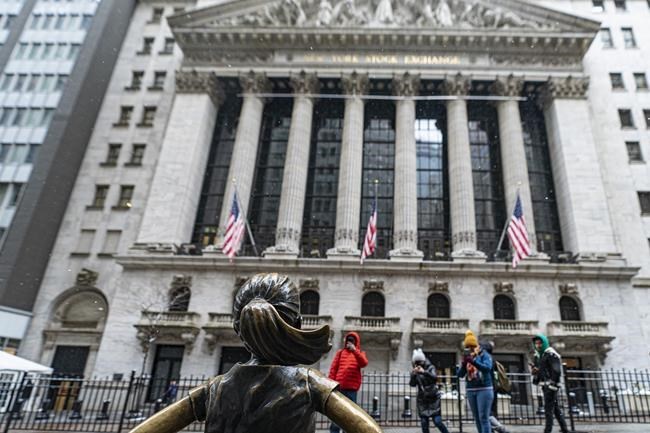NEW YORK (AP) — Stocks slipped to send Wall Street to a rare losing week, just its second in the last 16. The S&P 500 fell 0.5% Friday after a report on inflation at the wholesale level came in hotter than expected. The benchmark index set a record high a day earlier. The Dow Jones Industrial Average fell 0.4%, and the Nasdaq composite fell 0.8%. The inflation report was the latest reminder that the battle against rising prices isn’t over. Treasury yields rose after the data kept the door closed on hopes that the Federal Reserve could cut interest rates in March.
THIS IS A BREAKING NEWS UPDATE. AP’s earlier story follows below.
NEW YORK (AP) — Another hotter-than-expected update on inflation is keeping U.S. stocks in check on Friday.
The S&P 500 fell 0.2% in afternoon trading, trimming some of its earlier losses from the morning. It's drifting near its all-time high set the day before, but on track for just its second losing week since late October.
The Dow Jones Industrial Average was 65 points lower, or 0.2%, as of 2:46 p.m. Eastern time, and the Nasdaq composite was down 0.4%.
Friday’s report on inflation at the wholesale level was the latest reminder that the battle against rising prices still isn’t over. Prices rose more in January than economists expected, and the numbers followed a similar report from earlier in the week that showed living costs for U.S. consumers climbed by more than forecast.
Treasury yields rose in the bond market immediately after the report’s release. The data kept the door closed on hopes that the Federal Reserve could begin cutting interest rates in March, as traders had earlier hoped. It also discouraged bets that a Fed move to relax conditions on the economy and financial markets could come even in May.
The yield on the 10-year Treasury climbed to 4.29% from 4.24% late Thursday, and it earlier neared its highest level since November. Higher rates and yields make borrowing more expensive, which tighten the brakes on the economy and hurt prices for investments.
Still, the recalibrated bets for cuts to rates have simply brought Wall Street’s forecasts closer to what the Federal Reserve has been outlining. Critics have been saying traders’ expectations had gone overboard in how quickly and how much the Fed could cut rates in 2024. The expectation for the Fed’s next move is still for a cut to its main interest rate, which is at its highest level since 2001, as it’s said it likely will do.
In the meantime, the hope is that the economy continues to remain solid despite high interest rates.
A preliminary report on Thursday suggested that sentiment among U.S. consumers is still rising, though not by quite as much as economists hoped. That's key because spending by consumers makes up the bulk of the economy. In one potentially discouraging signal, the report from the University of Michigan also said that expectations for inflation in the coming 12 months ticked up to 3% in February from 2.9% in January.
If the economy does remain resilient, it would allow companies to deliver growth in profits.
Applied Materials climbed 7.6% after it reported stronger profit for the latest quarter than analysts expected. The company designs and manufactures systems used to fabricate semiconductor chips, and it’s benefiting from the frenzy underway for artificial-intelligence technology.
Cryptocurrency company Coinbase Global leaped 11.6% after it reported much better results than forecast. Higher crypto prices helped drive more transaction revenue for the company.
On the losing end was Digital Realty, which sank 8%. The owner of data centers reported weaker results than expected.
In stock markets abroad, indexes climbed across much of Europe and Asia.
In Japan, Tokyo’s Nikkei 225 rose 0.9% and got close to its record high set at the end of 1989. That was just before Japan’s “bubble” economy burst as stock and real-estate prices plunged.
Japanese stocks have been rising even though its economy has shrunk to become the world’s fourth-largest.
___
AP Business Writers Matt Ott and Elaine Kurtenbach contributed.
Stan Choe, The Associated Press



